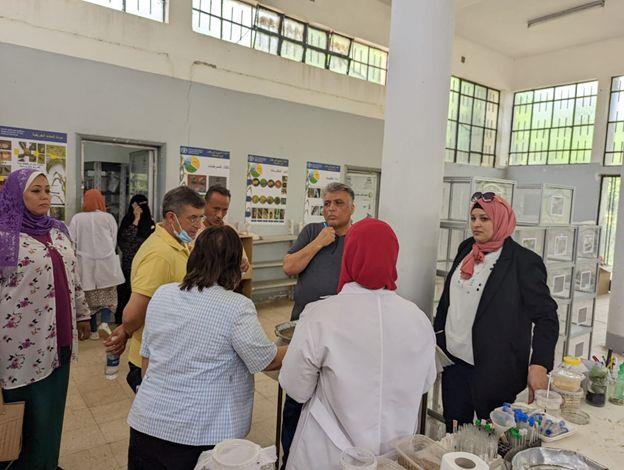FAO Organizes a Program for Training and Exchanges of Expertise in the Field of the Biological Control of Fall Armyworm

FAO Organizes a Program for Training and Exchanges of Expertise in the Field of the Biological Control of Fall Armyworm
Egypt, 9-12 May 2022 Within ongoing cooperation between the Food and Agriculture Organization (FAO) and the Ministry of Agriculture and Land Reclamation in the Arab Republic of Egypt, FAO organized an advanced training program on producing biopesticides and the mass production of the natural enemies to combat Fall Armyworm.
Under the activities of the Regional FAO project "Emergency preparedness and response to strengthen capacities of the NENA countries to mitigate the risk of Fall Armyworm (FAW) in the region", a delegation of experts from the plant protection division and biological control Dept.- Ministry of Agriculture – Syria- was received by the Plant Protection Research Institute (PPRI)-ARC-Egypt.
Mr. Thaer Yaseen, the Regional Plant Protection Officer, FAO-RNE, stated that the training program comes within the FAO regional plan to support and strengthen the capacities of the FAW affected countries in the NENA region to control FAW using sustainable and safe methods such as the biological control to reduce the use of the chemical pesticides and to protect the environment and human and animal health.
In his opening speech, Mr. Ahmed Abdel Mageed, the head of the PPRI presented the main activities of the institute also, the collaboration between PPRI and the FAO to combat FAW through the monitoring, survey programs also the various strategies and actions that have been taken to combat the pest in Egypt.
The Regional Plant Protection consultant, FAO-RNE, welcomed the experts and stated the various FAO efforts to contain the FAW in the region. She stressed the need for sustainable control methods, the importance of regional cooperation, and the exchanges of expertise in the fieldof biological control of FAW. The Advisor to the Minister of Agriculture for Agricultural Quarantine and Phytosanitary added that through the initiative of the FAO Global Action, IPM packages are currently being tested in Egypt as a demonstration country. This package includes using the natural enemies as the biological control to combat the Fall Armyworm.
The training program included a visit to the biopesticide production unit in Giza, where Mr. Ahmed Adly and his teamwork presented the unit's activities and explained the methods of producing fungal, bacterial, viral, and nematode biopesticides and their effectiveness in mitigating the impact of Fall Armyworm.
The delegation also was received by Mr. Hossam El-Gabaly, the director of the Biological Control Lab and his teamwork in Shandawil -Sohag who introduced the activities of the lab, the mass rearing of the host pests, the synthetic media, and the mass production of the FAW natural enemies, including various parasitoids, predators, and spiders. The experts from Syria participated in the mass release of different parasitoids such as Telenomus and Trichogramma in some maize fields.
Finally, the visit programme was achieved as planned by FAORNE, and was distinguished by the valuable scientific discussions and the exchange of experiences between the Syrian and Egyptian sides in biological control. In Syria, it is worth mentioning that there are five laboratories for breeding natural enemies, three of which are operational and two affected by the conditions of instability in its regions.
It is noteworthy that once the presence of Fall Armyworm (FAW) was confirmed in Egypt, the FAO began setting up technical cooperation programs to provide support and train many specialists, also providing the ministry with the traps and special tools to monitor and control the FAW pest. FAO assisted officials in developing a plan and providing technical and scientific consultations, and upgrading the Egyptian laboratories for the mass rearing of the natural enemies.
